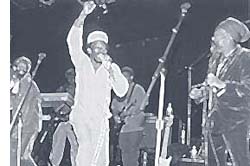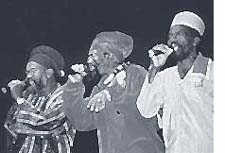“There is a land far far away; Where there’s no night, there’s only day; Look into the Book of Life, and you will see; That there’s a land far far away.”
-“Satta Massagana,” The Abyssinians
The Abyssinians, known for their spiritual anthem “Satta Massagana,” are one of the most influential reggae bands of this time. The roots-heavy trio was formed in 1969 by Donald Manning, Linford Manning (his younger brother) and Bernard Collins in Kingston, Jamaica.
In the 60s and 70s, The Abyssinians sang of protest, spirituality and devotion, mixing patois and Amheric to create a new cultural awareness. Their first album, Satta Massagana [Heartbeat 120], included “Declaration Of Rights” and “African Race.” In 1982 they released their second album Forward [Alligator U.S.] which featured “Mabrak” and “Forward Onto Zion.”

The Abyssinians
However, for the last two decades, not much has been heard from this legendary band. It has only been recently that they have returned to music. During their long hiatus, Linford and Donald moved to Florida (1984), holding non-musical careers. In Jamaica, Bernard Collins continued to play music and, to Donald Manning’s dismay, took on two new singers to form The New Abyssinians. During this time, Linford became a born-again Christian and now will sing only in the church. In the early 90s there was a resurgent interest in their music and in 1994 The Best of the Abyssinians [Musidisc 111922] was released in France. This album included their music from 1969-1976. Since then, they have reunited for seven tracks on the Reunion album [Artists Only Records AOR5, 1998] which was released in 1996 as $19.95 + Tax [Abyssinians USA].
The Abyssinians, which currently includes Donald Manning, Carlton Manning (Donald’s older brother) and Star David recently toured the United States and performed at Maritime Hall in San Francisco and Palookaville in Santa Cruz in November.

The Abyssinians
I had an opportunity to interview Donald Manning on Nov. 16, 1998, while he and the group were staying in Berkeley for their Bay Area performances.
Laura Gardner: Let’s start from the inception of The Abyssinians-how did you and your brother, Linford, and Bernard Collins start singing?
Donald Manning: I got some inspiration from Carlton, my older brother. He used to play the guitar-he taught me to play the guitar and I taught Bernard. Carlton and Linford used to sing together and I used to sing and Bernard joined me, so we moved on from there. After Carlton did “Love Me Forever” (1968), we did “Satta Massagana” (1969). Linford started to sing with The Abyssinians and he never sang much with Carlton & the Shoes anymore. He stayed with the Abyssinians.
LG: When you first started, who were you listening to? What were your influences back then?
DM: Nat King Cole, Billy Eckstine, Bing Crosby, Chubby Checker, Chuck Berry, Smokey Robinson, all those legendary musicians.
LG: When did you first get money for playing? And how did it feel?
DM: When I get money for playing? Well, start with recording. We take our money and do the recording, so generally we always have money to do recording. But, money for playing, no. When I got money for playing was when we were dealing with Virgin Records … Even though we’re not getting the right money for playing, we’re still satisfied and give thanks for what we get.
LG: Hopefully, you enjoy it. I understand you had to work outside the music industry for your survival. What sort of jobs did you do?
DM: When I was a kid, I grew up on the racehorse-track. I was always around the horses and I did different things. My main goal was the music, but racehorse was my first trade.
LG: What did you do at the racetrack?
DM: I was learning to ride. And after a while I become big, so what I did, I leave the racehorses alone. But in 1991, I went to Calder Racetrack, in Florida where I was living and working for four years, and I made two songs for this album [Reunion]: “Holy Man” and “In A Kalda,” in Calder racetrack.
LG: Was there ever tension in the group about who was getting the most attention from the fans and the press while you were working together?
DM: Generally, we worked in England and the work was just the same for everyone, but after a while, my bredren in Jamaica [Bernard Collins], him try to get attention of other people. Me and my smaller brother were in America and he went to Jamaica and got two men, and they called themselves the New Abyssinians and one of the guys sang on one of the songs that we did. All of those songs that we did were Bernard Collins, Linford Manning and Donald Manning. And right now, him don’t want to deal with me. …Him never know nothing at all about the African literature because I taught Bernard Collins and my smaller brother, Linford Manning, about African culture and those things. I was the older among the three of us so I showed them what I learned and I used to go to some Rastaman… I get knowledge and I imparted it with my brothers…
LG: Did you ever perform in front of an audience who you felt just didn’t understand where you were coming from or didn’t understand what you were about?
DM: No, everywhere I go, people sing my songs: Belgium, Germany, France, England, all over I go. And everywhere I go, from song start playing, the people, even in France, sing the song also.
LG: What are the differences between the audiences in all those places-in Japan or in Jamaica?
DM: We’ve never gone to Japan, but the audience in Jamaica, it’s limited because when we go there, white people support the music more than black people. I’m not putting down black people, but on the whole, white people follow reggae music more. Black people sing the music, but white people promote it. Them have the money to spend. …The culture, the Rastaman, the black people them been through the struggle and them have the culture. …[this racial awareness] is a part of life, and God made everyone, black and white, so we just have to live and do the right thing. I’m not discriminating against white people. There are good and bad in every nation.
LG: Where does the inspiration come for writing your songs?
DM: I read the Bible and I get a lot of inspiration by reading the Bible. When I’m around the horses, I get a lot of inspiration also. God just put it in you and it come. If you just think about positive things, positive things will come.
LG: What is the songwriting process for you?
DM: I play the piano and I play the guitar, so when I start, get some inspiration, I just go toward my piano and find some key and start to play. And if what I play don’t suit at that time, I try to get something that at first instance is what comes to you, and keep doing that until further on. If it’s not what you’re really looking for, you can change it, but you have the idea of what you were looking for before. So, I have keyboard and I have instruments. And I play… I have a computer that has music and it has 64 tracks on it, so music and my sons play and my brother. I got three musicians in my sons: drum, bass and keyboard.
Laura Gardner: You have a whole band in your family!
Donald Manning: Well, we have to give thanks for that.
LG: What adversity have you had to overcome to be here today?
DM: Everything is hard, but if you put some effort into it, it becomes easy. Even going to bed is not easy, because a plane can crash into your house and kill you. Have to think about God in every way.
LG: What are you most proud of in your life?
DM: What I am most proud of? That I know Jah Rastafari, because that is my strength of my walk of life: knowing truth and right. If you don’t know where you are going, you’re not going to know where you’re coming from.
LG: True. I was at the show at Maritime Hall with Ras Shiloh, Ras Michael and The Abyssinians—a great show. What new talents impress you these days? What new music are you listening to or inspired by?
DM: In this time? I cannot say I don’t think about the new music, but all of this music…they are singing the old rhythms that we did from in the 60s and the 70s. So they are doing them—not creating new music… only putting different lyrics on it. And they are not putting them to get positive like we used to do it—Alton Ellis, Ken Boothe, Delroy Wilson, John Holt, Paragons and Mighty Diamonds. You know? When we used to do those things, we used to have some good things set up but these artists that I see now, a lot of them, them singing on 4 chords and them only singing one chord. Them don’t change so them don’t know. A lot of them don’t know when it is good from when it is not. But I still can’t put them down ’cause this world is where we’re living and everyone has a season and find that they can get theirs.
LG: It’s interesting that you say that a lot of it comes from the 60s, I hear that all the time. Recently, I listened to the Reunion album—which I think is fantastic—and fundamentally, the harmonies on this album mirror the harmonies in the older music. How do you keep that timeless quality?
DM: I’ll show you now. This album here, Reunion, we have seven tracks on it that the original members of The Abyssinians sing. So it must sound close to the Satta Massagana that Heartbeat has, because we are the same persons doing it. Some of the tracks, I did them by myself and I got help on a couple of them, but seven of the tracks are original, so it must sound as close to what was there before. But we still have good quality because we know what we want, so we have to put it on and if it don’t sound good, we got to change it until it sound the way you need it.
LG: It was wonderful to see both the older and younger reggae fans enjoying your show at Maritime Hall—you always bring a positive message to the people.
DM: My pleasure, and I’ll come again.





